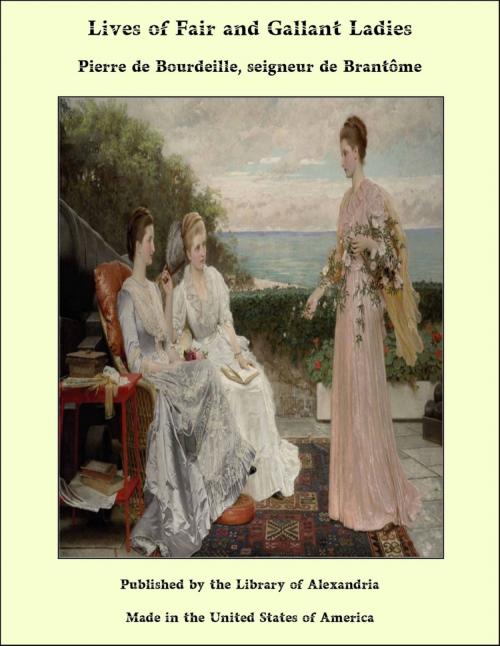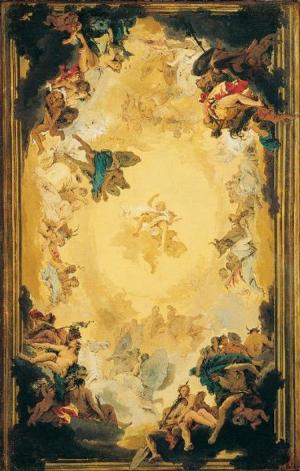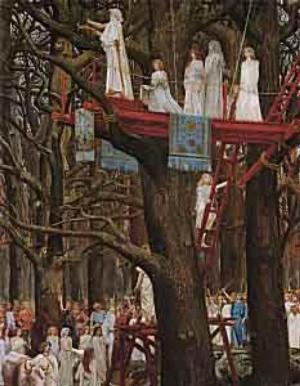Lives of Fair and Gallant Ladies
Nonfiction, Religion & Spirituality, New Age, History, Fiction & Literature| Author: | Pierre de Bourdeille Brantôme | ISBN: | 9781465600646 |
| Publisher: | Library of Alexandria | Publication: | March 8, 2015 |
| Imprint: | Language: | English |
| Author: | Pierre de Bourdeille Brantôme |
| ISBN: | 9781465600646 |
| Publisher: | Library of Alexandria |
| Publication: | March 8, 2015 |
| Imprint: | |
| Language: | English |
And now we find seated on the throne of France a young Monarch of a strange, wild, unattractive exterior. His eye is pale, colourless and shifty, seeming to be void of all expression. He trusts no man, and has no real assurance of his power as Sovereign; he looks long and suspiciously at those about him before speaking, rarely bestows his confidence and believes himself constantly surrounded by spies. 'Tis a nervous, timid child,—'tis Charles IX. History treats him with an extreme severity; and the "St. Bartholomew" has thrown a lurid light over this unhappy Prince's figure. He allowed the massacres on the fatal nights of the 24th and 25th of August, and even shot down the flying Protestants from his palace roof. Without going into the interminable discussions of historians as to this last alleged fact, which is as strongly denied by some authorities as it is maintained by others, I am not one of those who say hard things of Charles IX. It is more a sentiment of pity I feel for him,—this monarch who loved Brantôme and Marot, and who protected Henri IV. against Catherine de Medici. I see him surrounded by brothers whom he had learned to distrust. The Due d'Alençon is on the spot, a legitimate object of detestation by reason of the subterranean intrigues he is for ever hatching against his person; while his other brother Henri (afterwards Henri III.), Catherine's favourite son, is in Poland, kept sedulously informed of every variation in the Prince's always feeble health, waiting impatiently for the hour when he must hurry back to France to secure the crown he covets. Then his sister's vicious outbreaks are a source of constant pain and anxiety to him; and last but not least there is his mother Catherine de Medici, an incubus that crushed out his very life-breath. He cannot forget the tortures his brother Francis suffered from his mysterious malady, and his premature death after a single year's reign. Catherine hated Mary Stuart, his young Queen, whose only fault was to have exaggerated in herself all the frailties together with all the physical perfections of a woman; and dreadful words had been whispered with bated breath about the Queen Mother. An Italian, deprived of all power while her husband lived, insulted by a proud and beautiful favourite, yet knowing herself well fitted for command, she had brought up her children with ideas of respect and submission to her will they were never able to throw off. The ill-will she bore her daughter-in-law was the cause of all those accusations History has listened to over readily. But Charles, a nervous, affectionate child, whose natural impulses however had been chilled by his mother's influence and the indifference of his father Henri II., was thrown back on himself, and grew up timid, suspicious and morose. The frantic love of Francis for his fascinating Queen, the cold dignity of Catherine in face of slights and cruel mortifications, her bitter disappointment during her eldest son's reign, her Italian origin (held then even more than now to imply an implacable determination to avenge all injuries), her indifference to the sudden and appalling death of the young King, the insinuations of her enemies,—all combined to make a profound impression on Charles, giving a furtive and, if we may say so, a haggard bent to his character. Presently, seated on the throne of France, Huguenots and Catholics all about him, exposed to the insults and pretensions of the Guise faction on the one hand and that of Coligny on the other, dragged now this way now that between the two, yet all the while instinctively drawn toward the Catholic side by ancestral faith and his mother's counsels no less than by reasons of state, Charles signed the fatal order authorizing the Massacre of the Saint Bartholomew.
And now we find seated on the throne of France a young Monarch of a strange, wild, unattractive exterior. His eye is pale, colourless and shifty, seeming to be void of all expression. He trusts no man, and has no real assurance of his power as Sovereign; he looks long and suspiciously at those about him before speaking, rarely bestows his confidence and believes himself constantly surrounded by spies. 'Tis a nervous, timid child,—'tis Charles IX. History treats him with an extreme severity; and the "St. Bartholomew" has thrown a lurid light over this unhappy Prince's figure. He allowed the massacres on the fatal nights of the 24th and 25th of August, and even shot down the flying Protestants from his palace roof. Without going into the interminable discussions of historians as to this last alleged fact, which is as strongly denied by some authorities as it is maintained by others, I am not one of those who say hard things of Charles IX. It is more a sentiment of pity I feel for him,—this monarch who loved Brantôme and Marot, and who protected Henri IV. against Catherine de Medici. I see him surrounded by brothers whom he had learned to distrust. The Due d'Alençon is on the spot, a legitimate object of detestation by reason of the subterranean intrigues he is for ever hatching against his person; while his other brother Henri (afterwards Henri III.), Catherine's favourite son, is in Poland, kept sedulously informed of every variation in the Prince's always feeble health, waiting impatiently for the hour when he must hurry back to France to secure the crown he covets. Then his sister's vicious outbreaks are a source of constant pain and anxiety to him; and last but not least there is his mother Catherine de Medici, an incubus that crushed out his very life-breath. He cannot forget the tortures his brother Francis suffered from his mysterious malady, and his premature death after a single year's reign. Catherine hated Mary Stuart, his young Queen, whose only fault was to have exaggerated in herself all the frailties together with all the physical perfections of a woman; and dreadful words had been whispered with bated breath about the Queen Mother. An Italian, deprived of all power while her husband lived, insulted by a proud and beautiful favourite, yet knowing herself well fitted for command, she had brought up her children with ideas of respect and submission to her will they were never able to throw off. The ill-will she bore her daughter-in-law was the cause of all those accusations History has listened to over readily. But Charles, a nervous, affectionate child, whose natural impulses however had been chilled by his mother's influence and the indifference of his father Henri II., was thrown back on himself, and grew up timid, suspicious and morose. The frantic love of Francis for his fascinating Queen, the cold dignity of Catherine in face of slights and cruel mortifications, her bitter disappointment during her eldest son's reign, her Italian origin (held then even more than now to imply an implacable determination to avenge all injuries), her indifference to the sudden and appalling death of the young King, the insinuations of her enemies,—all combined to make a profound impression on Charles, giving a furtive and, if we may say so, a haggard bent to his character. Presently, seated on the throne of France, Huguenots and Catholics all about him, exposed to the insults and pretensions of the Guise faction on the one hand and that of Coligny on the other, dragged now this way now that between the two, yet all the while instinctively drawn toward the Catholic side by ancestral faith and his mother's counsels no less than by reasons of state, Charles signed the fatal order authorizing the Massacre of the Saint Bartholomew.















